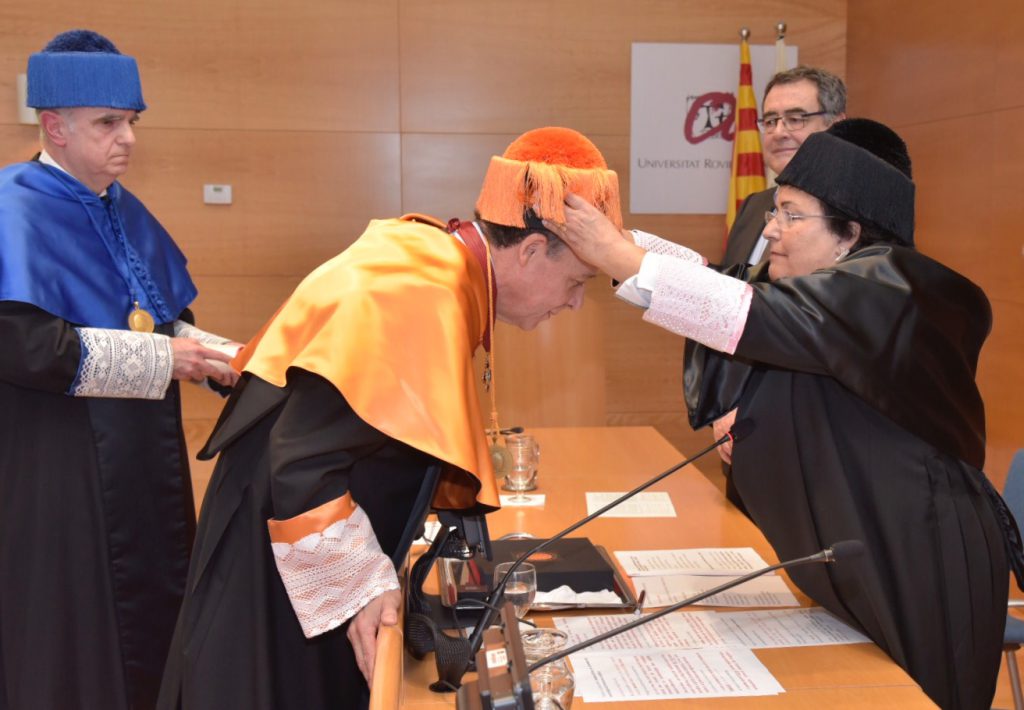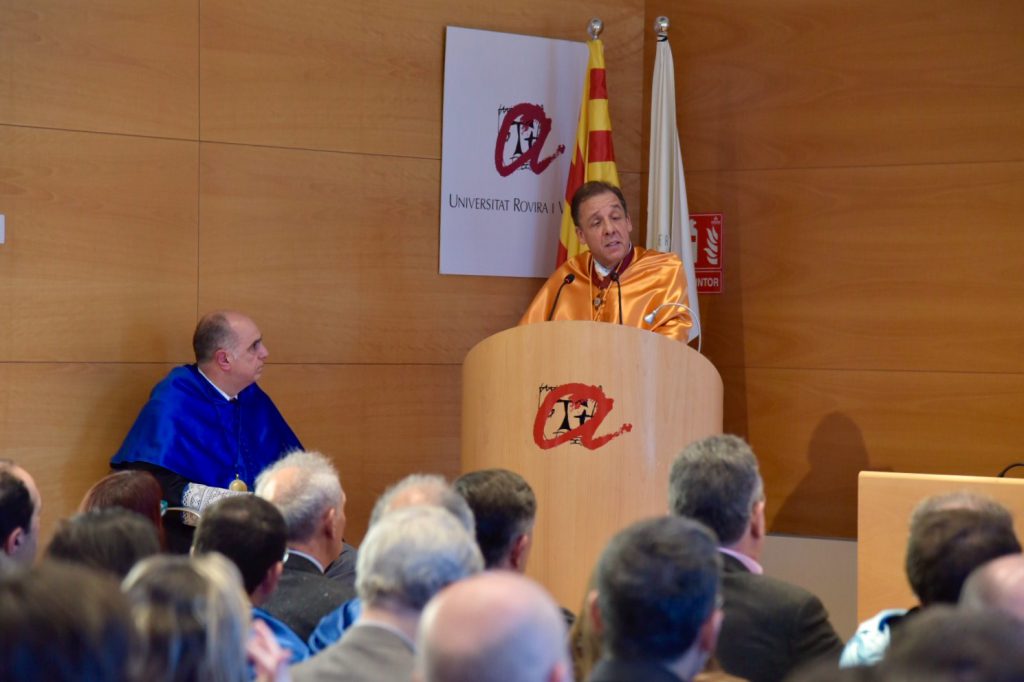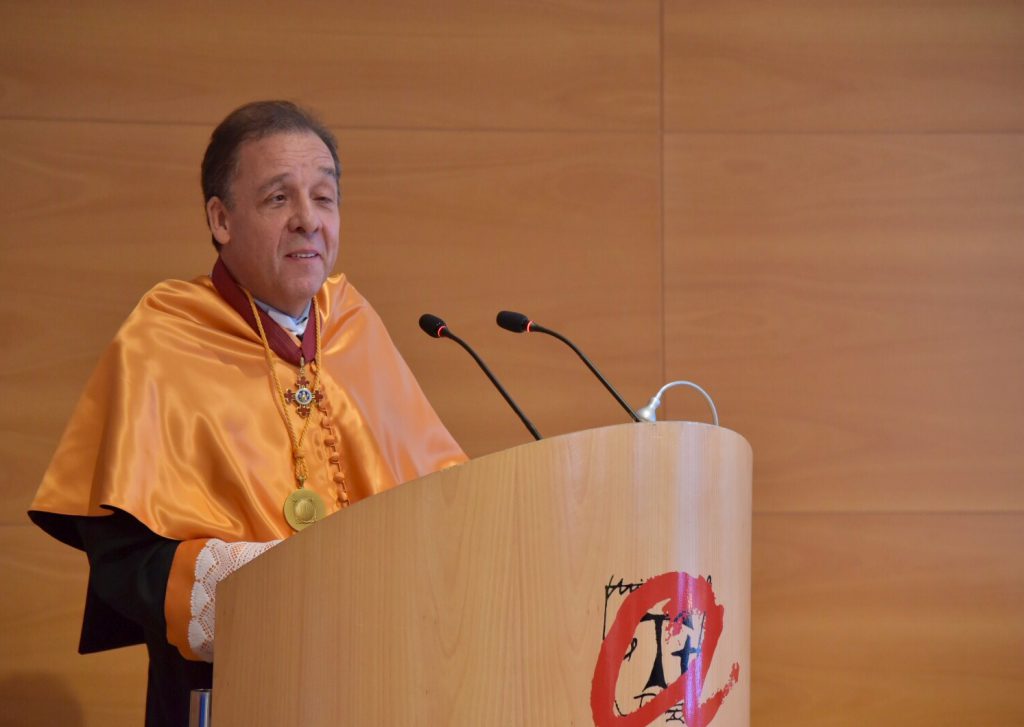08/02/2019
Xavier Prats: “Citizens need a lifetime subscription to be able to access the knowledge offered by universities”
The Director General of the European Commission, Xavier Prats, is awarded an honorary doctorate by the URV

The Director General of the European Commission, Xavier Prats, is awarded an honorary doctorate by the URV
Xavier Prats has worked for years at the heart of the EU’s institutions in the ambits of education, culture, and, most recently, public health. He has therefore contributed to the construction of Europe in areas of great importance to European citizens, who have witnessed women achieving more rights in a world still marked by gender inequality and where everyone, men and women, now have equal access to higher education. This sense of public duty was emphasised by Mr Prats’s sponsor, Francesc Xavier Grau, in his encomium during the former’s investiture: “We need constructors like Xavier Prats, who know how to make society, institutions and universities evolve”.
In keeping with his commitment to the construction of the European Union, Xavier Prats placed particular emphasis on the values on which the project of European integration has been built and in particular on the transformative power of education. After pointing to the Europe’s achievements in the area of education to date, Prats then went onto give an outline of education in the future: “It will not be the type of education that we know now, but rather much more collaborative and interdisciplinary than it is at present”.

On the one hand, students will need to be able to combine the sciences, the humanities and the arts in order to develop the products that we will need in the future. And on the other, they will need to adapt to permanent change, which means that the role of the professor will no longer be to transmit information, but rather to foster critical and strategic thinking in order to combine different information, understand other disciplines and distinguish the important from the irrelevant.
Universities, he therefore believes, have an important role to play in the transformation of education and he called on research and higher education institutions to “make their voice heard in the current public debate” to undo the paradox in which society is currently immersed: “Just as science and technology are advancing at a dizzying rate, scepticism towards science is also growing”. This is shown by increased mistrust in vaccines and the spread of homeopathy.
This context of scepticism, uncertainty and change means that the service offered by universities to society becomes fundamental, and Prats proposes that this service should be offered for life: “Why award only one qualification when what citizens need is a lifetime subscription to be able to access the knowledge offered by universities?”.
For the honorary doctor, strengthening universities means giving them more autonomy, more investment and removing administrative obstacles. In return, universities “need to be more transparent and responsible when giving an account of themselves”.

Prats expressed his concerns regarding the “fragility” of the European project at the current time and the rise of populism, but he is also aware of Europe’s importance. This is why he has so much hope in the capacity of universities and education in general to transform society and to accomplish the urgent task of “defending the intellectual and democratic liberty and freedom of expression”. To do this it is essential to restore the social values on which the idea of Europe has been built: “It can be made again”, he asserted.
Paraphrasing the speech given by another honorary doctor of the URV, Amin Maalouf, the success of failure of the European project “will determine if the human adventure can find the path towards progress”.
Prats concluded his speech by recalling to the struggles of women such as Maria Helena Maseras, who 150 years ago overcame tremendous obstacles to become the first women to be admitted to the Faculty of Medicine, although he also recognised that much work needed to be done before true equality between men and women is achieved. In this regard, the rector of the URV, María José Figueras, stated that the University, like society, needs to be more equal, and the fight to achieve this must involve men as well as women.
Xavier Prats is currently special advisor to Teach For All, a global non-profit organisation that works to increase educational opportunities around the world. It is present in 48 countries where it has helped ten million young people. A good part of Xavier Prats career has been at the European Commission where he held various positions until September 2018, including director general of Public Health and Food Safety from 2015 to 2018, where he was responsible for the EU’s regulations and programmes relating to health and food safety; director general of Education and Culture between 2011 and 2015, where he worked on the regulations affecting culture, education, young people and sport, including the Erasmus, Marie Curie and Creative Europe programmes. He was also director of Employment Policy, Lisbon Strategy and International Relations from 2007 to 2010, and assistant spokesperson to President Jacques Delors, among others.
Born in Tarragona, he graduated in Social Anthropology at the Complutense University of Madrid, and has completed two postgraduate degrees, one in Cooperation in Development at the Centre International des Hautes Études Méditerranéennes in Paris, and one in European Public Administration at the College of Europe in Bruges, Belgium.
This is the speech by Xavier Prats. This is the speech by the rector, María José Figueras.
More news about: European Comission, honorary doctorate
